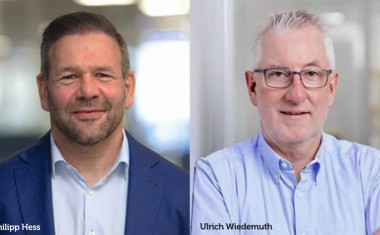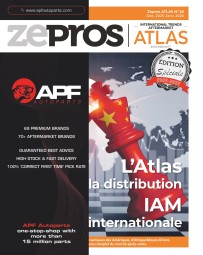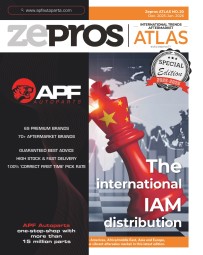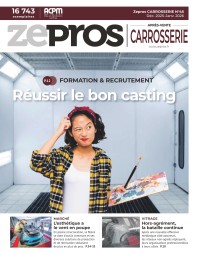
Ulrich Wiedemuth & Philipp Hess, bilstein group : “Past challenges have shown us that we have been able to learn and evolve”

The German equipment manufacturer specialising in the independent aftermarket has had to prove its agility to maintain momentum. But it remains confident. We interviewed Ulrich Wiedemuth, Group Sales Director Bilstein Group, and Philipp Hess, who will replace him at the end of 2025.
Ulrich Wildermuth: We will most likely reach and exceed our target of a 10% increase year on year, that’s nearly €1.3 billion.
UW: We encountered significant challenges that could not have been overcome without the collective efforts of our team and, most importantly, the unwavering loyalty of our customers.
Throughout 2024, the volume of incoming orders consistently exceeded our initial targets. However, it was only by the third quarter that we managed to restore availability to an acceptable level. This delay stemmed from various geopolitical crises that disrupted our plans and placed considerable strain on our supply chain. Additionally, the countermeasures required to address these issues led to increased costs.
The broader economic uncertainty, compounded by unclear political initiatives concerning electric vehicles—including their taxation, charging infrastructure, or in many cases, the lack thereof—helped the IAM sector.
Philipp Hess: We have to remain agile, to be able to adapt quickly to changing circumstances. With enhanced analytical capabilities, we can now identify trends and trajectories more rapidly. Today, we have access to vast amounts of data, enabling us to make more accurate forecasts. Rather than merely setting annual targets, we calculate and simulate a range of scenarios. Our focus has shifted toward understanding market dynamics and long-term trajectories.
The IAM sector remains fundamentally stable due to the existing vehicle parc but is inherently volatile due to the actions of its diverse stakeholders. Early warning systems mean we can make swift decisions, allowing for faster and more effective responses. Operating on all continents, we gain valuable insights from regional developments that may later emerge in other markets. Our perspective continues to grow increasingly global, supported by dedicated and highly engaged regional teams empowered to act accordingly.
UW: This region remains our most important market, where we continue to experience strong growth. We are fully committed to meeting the evolving needs of our customers. Guided by the motto “More space, more parts, more business,” we are expanding our logistics capacities, increasing product availability, and driving greater business opportunities with our customers.
Additionally, we are broadening our product portfolio and tailoring it to meet the needs of vehicle parcs in specific regions worldwide.
The Asia Pacific, Middle East and Africa, Latin America, and North America regions are becoming increasingly significant, prompting us to make strategic investments in these areas. Among these, the Middle East and Africa stand out as top priorities for investment. Our growth strategy is not confined to organic expansion; we are actively exploring acquisition opportunities to strengthen our position. To compete effectively with well-established players in these regions, we leverage the strength of our brands. Brand recognition is a critical asset and a cornerstone of our success.
PH: I think that European manufacturers and their Tier 1 suppliers have acted according to the projections created by European policy, rather than paying attention to the real needs of consumers. This premature shift to fully electric powertrains has created a situation where European manufacturers have lost a lot of ground to the growing Chinese players. They have created drivetrain concepts that allow for a fully electric and a hybrid version of the same car. Their most successful version of a PHEV (ICE engine and electric battery) uses the range extender technology, which BMW introduced in the i3 model 2013. Many range extender models are emerging, solving the range problem in a very pragmatic way while enabling the energy transition.
UW: I am not worried about the future of our industry in general, and of the Bilstein Group in particular. Our industry is about selling replacement parts for something that wears out. As long as something moves, there is wear and tear. We are all part of an industry that provides consumers with affordable and sustainable automotive mobility. When mobility changes, we change as an industry and so does commerce. The many challenges of the past have shown us that we have been able to learn, embrace and overcome. Despite these complex and uncertain times, the aftermarket has a parc of over 1.6 billion cars, which is not going to disappear or change overnight.
PH: The current difficulties for European and Japanese car manufacturers is putting suppliers under severe strain. They are the ones who are suffering the most from the decline in OE activity. Today, the aftermarket divisions are larger than ever, and every supplier will try to compensate the losses suffered in original equipment with IAM. At the same time, Tiers 2 and 3 have free production capacities, which further increases the pressure on the market as these factories try to sell their products on the aftermarket. But the most important thing is to protect the free choice of repairer. On this issue, lobbying by the manufacturers will only increase. The independent aftermarket will have to continue its fight! Bilstein Group, whose core business is IAM, will always be part of this battle.








